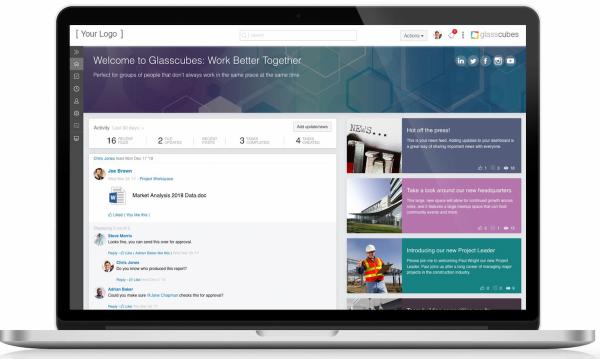Are You Ready For How Technology Will Impact Accounting In 2024?
on 31 January 2024
The accounting industry is on the brink of change thanks to technological advancements that will reshape the way we work. As the demand for accurate, timely financial information continues to grow, accounting professionals need to keep up with the latest trends.
Part of this involves understanding how technology will impact accounting in 2024.
From blockchain technology and artificial intelligence (AI) to streamlined file sharing and sophisticated client portals, these innovations will enhance security, automation, collaboration, and information tracking.
In this article, we’ll walk through 11 ways accounting will be affected by technology advancements in 2024.
Want to future-proof your accounting processes? Get in touch to see how a secure online workspace like Glasscubes can drive growth.
11 Ways Technology Will Impact Accounting in 2024
1. Blockchain technology will streamline transactions and reduce fraud risk.
Blockchain technology is a distributed ledger that enables accounting records, financial transactions, and data to be shared across a network of computers.
Essentially, it allows secure and transparent transactions to occur without the need for a single organisation or entity to be in control, reducing the need for intermediaries.
The benefit for accounting professionals in 2024? Blockchain technology has the potential to revolutionise the industry by enabling accountants to record transactions and verify their accuracy with greater ease.
For example, if an organisation uses blockchain technology to manage its accounting records, the company will be able to create an immutable ledger that cannot be altered. This means the records will be tamper-resistant and can be audited easily, helping to boost trust and transparency among the firm’s clientele.
2. Artificial intelligence and robotic process automation will supercharge efficiency and accuracy.
Artificial intelligence (AI) is the simulation of human intelligence in machines that are programmed to think, learn, and improve. AI allows accounting professionals to automate a number of tasks, such as data entry and reconciliation.
For instance, if an organisation uses AI for its month-end close, the process can be completed in days instead of weeks. Additionally, AI can reduce the risk of errors and fraud by identifying anomalies in the data and raising alerts.
Robotic process automation (RPA), a different technology that does not require machine learning, also helps to automate repetitive tasks. As such, RPA can decrease manual mistakes and increase efficiency in data entry, report generation, and data reconciliation.
For example, if a company uses RPA for its accounts payable process, invoices can be processed and paid much faster than if this was done manually.
“The boring, unpleasant work of accumulating and computing data is one of the aspects of accounting that professionals dislike the most,” says Darshan Somashekar, CEO of Solitaired. “However, thanks to technological advancements, accountants can now do all of this with the click of a button.”
Somashekar adds that modern accounting software has given accountants more time to devote to a wider range of tasks. They are increasingly able to move away from time-consuming number crunching and into roles that require a more strategic outlook. “Data analysis and interpretation, financial planning guidance, and business consulting are just a few examples.”
3. Cloud computing will increase flexibility and lower costs.
Cloud computing technology provides accounting professionals with the ability to access software and data over the internet, no matter where you’re located. It can drive down costs and offer greater flexibility by eliminating the need for physical computer servers.
With cloud-based accounting software, an organisation can easily add new modules or users without having to purchase additional hardware or software licenses. Additionally, cloud computing can improve collaboration by allowing accounting professionals to make changes to the same document in real-time.
“By far, the most disruptive revolution we've seen in the accounting industry has been cloud-based accounting,” says Martin Chee, CFO of Amaka. These solutions have made it significantly easier to have accurate, up-to-date books around the clock.
Plus, they've unlocked the ability for accountants to create entire digital ecosystems where different digital tools can talk to one another. “You can now manage your accounting from anywhere, at any time, and give access to people all over the world,” Chee adds.
This also means that organisations can outsource their accounting needs to service providers from distant locations. According to Johannes Larsson, CEO of Financer.com, small to medium-sized businesses previously had no choice but to use the services of nearby accountants or have an in-house team of accountants. Not only did this limit the accessibility of affordable accounting solutions, but it also severely limited collaboration since only a few people could access a company’s books.
“Cloud accounting has enabled easier access, so users can pull massive financial data, as long as they have reliable internet access,” Larsson says.
4. Client portals and file sharing platforms will improve customer service and transparency.
Client portals are secure websites that allow clients to view their financial statements, invoices, and other related information. These portals reduce the time it takes accounting firms to respond to client queries by allowing clients to access their information, improving client service overall. They also cut down on the need for accountants to chase down files from clients, essentially removing unpleasant and time consuming administrative work, and ensuring that accountants can always find the client information they need.
File sharing isn’t only beneficial between accounting professionals and their clients. Technology also enables accountants to securely share files with one another, saving time and boosting collaboration by allowing multiple users to work on documents simultaneously.
By leveraging a file sharing platform for its audit documentation, an organisation’s auditors can access documents remotely and work on them at the same time without issue. Additionally, file sharing can reduce the risk of errors and fraud by ensuring that only authorised personnel can access the documents. This is yet another major way technology will impact accounting in 2024.
5. Robo-advisory will enhance portfolio management and risk tolerance assessments.
Robo-advisory involves the use of automated algorithms to provide financial advice and investment management services. This technology combines AI and machine learning (the field of AI that enables computers to learn from and make decisions based on data) to offer personalized, cost-effective investment recommendations.
Robo-advisory will continue to affect the way accounting professionals handle investment-related activities. For instance, firms can offer robo-advisory services that give clients real-time investment advice tailored to their financial goals and risk preferences. This will enhance customer satisfaction, promote efficiency, and drive down costs.
6. Drones will allow auditors to focus on strategy and compliance.
By leveraging drones in inventory management in 2024, auditors will be able to shift their attention from counting boxes to more valuable and critical activities like strategic decision-making, identifying potential irregularities, and ensuring compliance.
In the past, auditors have experienced a lot of headaches when it comes to counting inventory, says Stephanie Ng, CPA and owner of IPasstheCPAExam.com. “If you’ve ever had the ‘joy’ of conducting a manual inventory count, you know there’s nothing exciting about it.”
She adds that auditors wind up wandering around an often unorganised warehouse trying to find obscure items. This process could take hours, if not days, to complete and often results in discovering various discrepancies. “Now, we have robots and drones to roam the warehouse to keep track of items.”
Embracing this technological advancement will not only streamline operations for companies, but also elevate the role of auditors in the industry as valued advisors and strategic partners.
7. Cybersecurity measures will safeguard against data breaches, identity theft, and ransomware attacks.
As technology advances, cybersecurity becomes increasingly crucial for protecting sensitive financial data. In 2024, accounting professionals will need to adopt robust cybersecurity measures to safeguard against threats such as data breaches, identity theft, and ransomware attacks.
Using technologies like encryption, multi-factor authentication, and AI-powered anomaly detection will be essential to ensure data integrity and maintain client trust.
For example, organisations may implement biometric authentication, such as fingerprints or facial recognition, for employees to access financial systems and sensitive data. Additionally, AI-driven cybersecurity solutions can continuously monitor network traffic, detect abnormal behavior, and provide real-time alerts to prevent potential breaches.
8. Natural language processing will revolutionize the handling of unstructured data.
Natural language processing (NLP) is a branch of AI that enables computers to understand and interact with human language. In the accounting world, NLP can be used to automate data entry, generate reports from textual data, and extract insights from unstructured documents such as emails and legal contracts.
Here’s how this technology will impact accounting in 2024. Let’s say an organisation starts to leverage NLP algorithms to extract relevant information from contracts and automatically populate accounting systems. The result? Less manual effort and a higher level of accuracy. As an added bonus, NLP-powered chatbots can also handle routine client inquiries, providing instant responses and enhancing customer service.
9. Big data analytics will transform the processing of large volumes of data.
Big data analytics refers to the process of examining large and complex data sets to uncover patterns, correlations, and trends. This can help accounting professionals gain valuable insights from large volumes of financial data, so they can make data-driven decisions, identify potential risks, and improve forecasting accuracy.
For instance, by using advanced algorithms and data visualization tools, organisations can identify cost-saving opportunities, forecast cash flow more accurately, and promptly detect potential fraudulent activities.
10. Accounting professionals will become more specialised.
As a result of all of these technological advances, general accounting is no longer in as high demand as it was in the past. Accounting has become about bespoke services and personalisation. In 2024, customers will continue to want their individual needs to be met instead of getting an off-the-shelf solution.
“Technology has forced specialisation onto the accounting industry,” says Perry Zheng, CEO of Cash Flow Portal.
Zheng says companies look for accounting solutions that can give them deeper insights rather than just an overall financial position, so they can make informed decisions. “Accounting software has evolved to meet these new needs. It enables customisation across every aspect of accounting, including data entry, reconciliation, and reporting.”
11. Business owners will be more adept at basic bookkeeping tasks, positioning accountants to help with more complex responsibilities.
Solutions such as QuickBooks have enabled individuals with no accounting background to maintain their own books. This will continue in 2024.
“As accounting software has advanced and become more user-friendly, business owners have been able to take care of more basic bookkeeping tasks—without consulting a CPA or enrolled agent (EA),” says Ng. “Before, if business owners needed a profit and loss statement to apply for a line of credit at the bank, they would have to ask an accountant to prepare it. Now, a business owner can simply create this financial statement on demand.”
Ng adds that this shift in dynamic—accountants being less involved in more simple accounting tasks—hasn’t eliminated the need for such professionals. CPAs and EAs are still invaluable for helping their clients with contentious or complex tax cases and performing other professional engagements, such as an audit, review, or compilation.
“The ever-increasing evolution of and access to technology simply means that accountants are able to shift their focus to areas that require more complex thought and consideration, rather than focusing on mundane, repetitive tasks they once had to juggle,” she says.
Embrace Innovation With Glasscubes
There’s no doubt that technology will continue to drive massive change in the accounting industry in 2024. Accounting professionals who embrace these innovations and adapt their practices accordingly will be well-positioned to succeed in the rapidly shifting landscape.

Leveraging technology like Glasscubes—a robust collaboration solution and client portal— can keep your entire organisation connected, whether you have a small or large workforce.
With Glasscubes, you can:
- Request files securely from clients, eliminating the hassle of searching for information and follow-ups.
- Collect, process, and approve information through customizable automated forms and workflows, complete with assignees and alerts.
- Create custom workspaces for each project team, enabling resource-sharing and easy oversight.

“Really enjoying using Glasscubes as an information gathering tool. We are a firm of accountants, and this clever but simple software is saving us time and helping us automate but maintain personal touch and branding.”
—Alison, a reviewer on Software Advice
With Glasscubes, accounting firms can achieve unprecedented levels of efficiency, collaboration, and oversight in 2024, taking their operational processes and client service delivery to new heights.
Experience the power of Glasscubes and take your accounting firm to new heights of collaboration and efficiency. Contact us today to get started.


